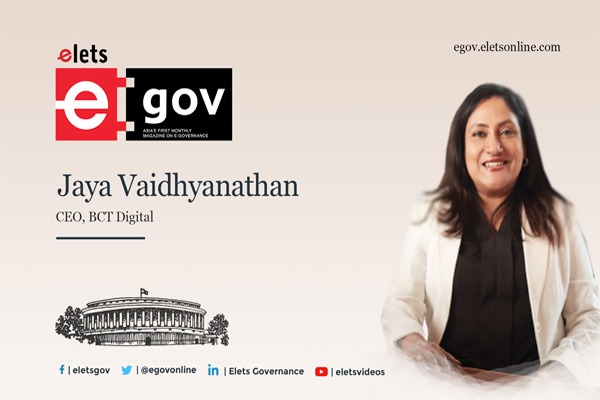
To meet the global net zero commitments by 2050, organisations need to double down on their cleantech initiatives, including the push to move to renewable fuels. Working in silos is not an option, and strong commitment, involvement, and public-private partnership are mandatory. Jaya Vaidhyanathan, CEO, BCT Digital shared her innovative ideas and solutions viz., energy sector in an exclusive interview with Garima Pant of Elets News Network (ENN). Edited Excerpts:
Please detail the contribution of your organisation through your various initiatives towards the clean-tech and ESG sector?
BCT Digital is a global digital transformation company delivering disruptive fintech, regtech, and cleantech solutions to large organisations across industry verticals. The company enables industries to predict, manage, and mitigate risks and take effective risk-resilient decisions leveraging next-gen technologies, sophisticated AI/ML models, data- driven algorithms, and predictive analytics.

BCT Digital helps large enterprises, and public organisations in delivering on their cleantech and ESG priorities. This includes enabling organisations to stay focused on their ESG journey and track their key metrics, KPIs, and disclosure requirements against global frameworks and standards, such as the Global Reporting Initiative (GRI), Task force on Climate-related Financial Disclosures (TCFD), Sustainability Accounting Standards Board (SASB), and UN Sustainable Development Goals (UN SDGs).
What are the innovations in the energy/clean-tech sector that aid organisations drive towards a sustainable future?

Globally, there are multiple innovations in the energy or cleantech sector that encourage organisations to contribute to green energy initiatives and net zero commitments. With COP27 already underway, the focus on reducing greenhouse gas (GHG) emissions is expected to increase in the future. With these priorities, the following are the key innovations to look out for in the coming years:
- Alternative/renewable energy– There is a pressing need today to move away from fossil fuels and towards alternative sources of energy. Renewable energy forms, like wind and solar, are increasingly favourable alternatives.
- Carbon capture, utilisation, and storage (CCUS)– This refers to the suite of technologies that focus on reducing emissions. Broadly, it involves the capture of CO2 from large point sources and its safe disposal.
- Artificial Intelligence (AI)– AI helps organisations pursue their green energy goals using smarter and more efficient ways to track and reduce energy use while also enabling them to manage complex, large-scale, and energy-intensive operations effectively.
- Alternative mobility– The transportation sector is a major contributor of greenhouse gas emissions. Alternative technologies, such as electric vehicles (EVs) and hydrogen cars, are gaining traction globally.
- Digitalization– With organisations spread across diverse segments and geographies, going digital has become instrumental to expediting the delivery of green and cleantech initiatives, particularly on the governance front.
Your thoughts on clean-tech Outlook 2030 and how Public Private Partnership can be successfully initiated & implemented towards attaining this goal?
To meet the global net zero commitments by 2050, organisations need to double down on their cleantech initiatives, including the push to move to renewable fuels. Working in silos is not an option, and strong commitment, involvement, and public-private partnership are mandatory.
The Government of India is enabling the country to meet its 2030 renewables ambition through public-private partnerships – by ensuring funding for clean energy innovations as envisioned under Mission Innovation 2.0. There are already two successful initiatives under the radar. The first one is the “Clean Energy International Incubation Centre – a unique Research and Innovation (R&I) model platform set up with private partner Tata Trusts, which has resulted in more than 20 clean energy solutions to help standalone researchers. The second one is the Joint Centre of the Department of Biotechnology (DBT) and Oil Marketing Companies (OMCs) that led to the development of 2G ethanol technology. There will be more such initiatives required to fund and expedite the ambition.
There is a renewed global focus in driving mission sustainability, clean energy targets, and the shift towards the adoption of Electronic Vehicles and renewable energy. How do you see India’s role and contribution towards this global focus?
With the rapid population growth, the shift towards renewables and alternative mobility is imperative. India is a big market for renewable energy and plays a vital role in the adoption of the same. It has already made a commitment to meet 50 percent of its electricity requirements from renewable energy sources by 2030 and aims to reach net zero emissions by 2070. This is a significant step. However, it needs to be complemented with alternative mobility solutions, such as electric vehicles, energy-efficient buildings, reduced carbon footprint, and the expanded adoption of cleantech.
Your thoughts on how sustainability can be embedded in the energy, clean-tech and ESG segment and what are the reforms at the central and state level needed to take this mission forward?
Sustainability is a key element and needs to be embedded as a part of the cleantech and ESG initiatives to measure the total impact it may have on the world. To promote sustainability, the centre and state need to work together and prioritise initiatives that will fast-track the green energy initiatives. They should promote investments in the renewables sector, particularly alternative sources like wind and solar, by providing infrastructure, easing up on norms, promoting “Make in India” initiatives, and incentivizing green energy initiatives.
Be a part of Elets Collaborative Initiatives. Join Us for Upcoming Events and explore business opportunities. Like us on Facebook , connect with us on LinkedIn and follow us on Twitter, Instagram.











